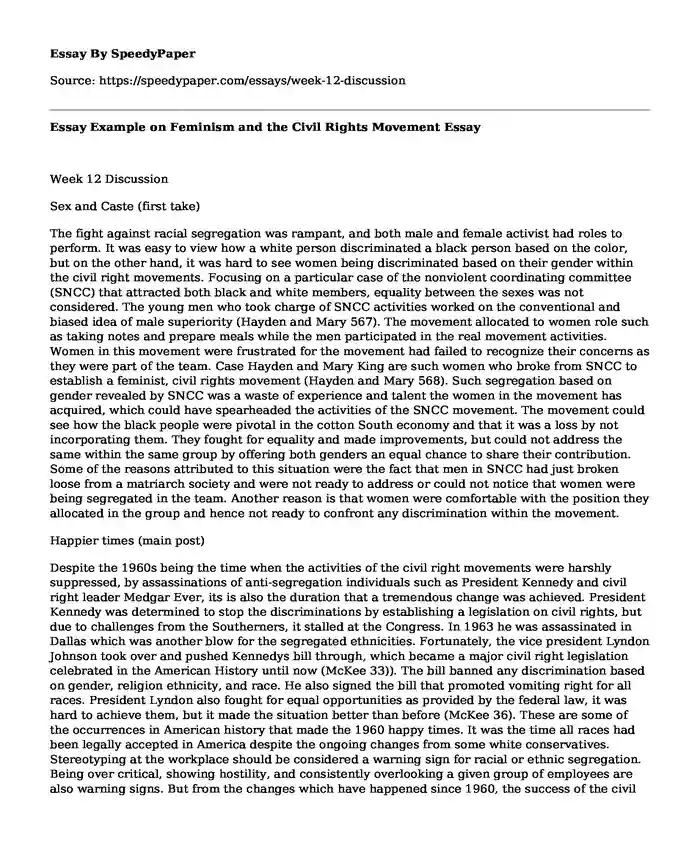Week 12 Discussion
Sex and Caste (first take)
The fight against racial segregation was rampant, and both male and female activist had roles to perform. It was easy to view how a white person discriminated a black person based on the color, but on the other hand, it was hard to see women being discriminated based on their gender within the civil right movements. Focusing on a particular case of the nonviolent coordinating committee (SNCC) that attracted both black and white members, equality between the sexes was not considered. The young men who took charge of SNCC activities worked on the conventional and biased idea of male superiority (Hayden and Mary 567). The movement allocated to women role such as taking notes and prepare meals while the men participated in the real movement activities. Women in this movement were frustrated for the movement had failed to recognize their concerns as they were part of the team. Case Hayden and Mary King are such women who broke from SNCC to establish a feminist, civil rights movement (Hayden and Mary 568). Such segregation based on gender revealed by SNCC was a waste of experience and talent the women in the movement has acquired, which could have spearheaded the activities of the SNCC movement. The movement could see how the black people were pivotal in the cotton South economy and that it was a loss by not incorporating them. They fought for equality and made improvements, but could not address the same within the same group by offering both genders an equal chance to share their contribution. Some of the reasons attributed to this situation were the fact that men in SNCC had just broken loose from a matriarch society and were not ready to address or could not notice that women were being segregated in the team. Another reason is that women were comfortable with the position they allocated in the group and hence not ready to confront any discrimination within the movement.
Happier times (main post)
Despite the 1960s being the time when the activities of the civil right movements were harshly suppressed, by assassinations of anti-segregation individuals such as President Kennedy and civil right leader Medgar Ever, its is also the duration that a tremendous change was achieved. President Kennedy was determined to stop the discriminations by establishing a legislation on civil rights, but due to challenges from the Southerners, it stalled at the Congress. In 1963 he was assassinated in Dallas which was another blow for the segregated ethnicities. Fortunately, the vice president Lyndon Johnson took over and pushed Kennedys bill through, which became a major civil right legislation celebrated in the American History until now (McKee 33)). The bill banned any discrimination based on gender, religion ethnicity, and race. He also signed the bill that promoted vomiting right for all races. President Lyndon also fought for equal opportunities as provided by the federal law, it was hard to achieve them, but it made the situation better than before (McKee 36). These are some of the occurrences in American history that made the 1960 happy times. It was the time all races had been legally accepted in America despite the ongoing changes from some white conservatives. Stereotyping at the workplace should be considered a warning sign for racial or ethnic segregation. Being over critical, showing hostility, and consistently overlooking a given group of employees are also warning signs. But from the changes which have happened since 1960, the success of the civil rights legislation is here to stay. Currently, all races are empowered in all manner and can easily advocate for their right if violated.
Work cited
McKee, Guian A. "This Government Is with Us: Lyndon Johnson and the Grassroots War on Poverty." The War on Poverty: A New Grassroots History 1964-1980 (2011): 31-62.
Hayden, Casey , and Mary Elizabeth King. "Feminism and the Civil Rights Movement (1965), Casey Hayden and Mary King." Wwnorton.com. N.p., 1987. Web. 2017. pp. 56869, 571 74.<http://www.wwnorton.com/college/history/archive/resources/documents/ch34_02.htm>.
Cite this page
Essay Example on Feminism and the Civil Rights Movement. (2017, Aug 14). Retrieved from https://speedypaper.net/essays/week-12-discussion
Request Removal
If you are the original author of this essay and no longer wish to have it published on the SpeedyPaper website, please click below to request its removal:
- Free Essay Sanple on the Education of a First-Generation American
- The Age of Online Reputation Management, Essay Sample for Everyone
- Styles of Managing Conflict, Free Essay for Students
- Accounting Essay Example: Lighting System
- Essay Sample for Students: Human Impact on the Environment
- Free Essay. Problems That Were Caused by Colorado Taxpayer Bill of Rights (TABOR)
- Essay Example on Addressing Domestic Violence: A Call for Societal Change and Reporting
Popular categories





